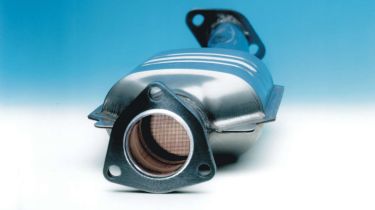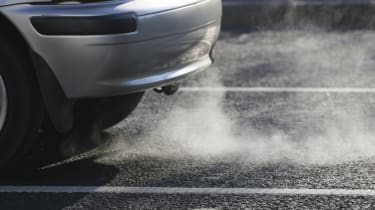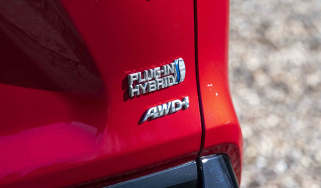What is a catalytic converter?
All new cars have a catalytic converter, but what exactly is it? Carbuyer explains

Catalytic converters, more commonly known as ‘cats’, have been a legal requirement on all new petrol and diesel cars since 1993. They contain a mix of precious metals, such as platinum, rhodium and palladium, that reduce pollution in exhaust gas as it passes through the converter. Unfortunately, the precious metals inside mean that catalytic converter theft is a common problem.
Below, we explain how a catalytic converter functions, why they are fitted, how long they last, and what steps you can take to prevent yours from being stolen.
What does a catalytic converter do?
A catalytic converter turns some of the engine’s harmful pollutants into carbon dioxide and water vapour. A metal exterior hides a delicate honeycomb structure that’s coated in precious metals. When heated, these materials cause a chemical reaction that purifies the exhaust gases. Because they need to be hot to work best, catalytic converters are usually placed near the engine where the temperature is highest.
 What is a Diesel Particulate Filter? Guide to DPFs and how to look after them
What is a Diesel Particulate Filter? Guide to DPFs and how to look after them
How long does a catalytic converter last?
You can expect a catalytic converter to last for at least 10 years, with many continuing to work until the end of the car’s life. However, they can fail prematurely in certain circumstances, which can lead to a very hefty bill. If you only make short journeys, where the engine hasn’t had a chance to warm up properly, the cat may not work as it should and may need replacing before the car’s a decade old.

What happens when a catalytic converter goes wrong?
Many newer cars will have inbuilt software that can detect when the catalytic converter has failed but there are also mechanical signs that can indicate it’s failed. If you notice that your car isn’t performing as well as normal, or that there’s dark smoke coming out of the exhaust, it could be a sign that your catalytic converter isn’t working correctly. Other telltale signs include a sulphuric, rotten egg-like smell from the exhaust and lots of heat coming from the underside of the car.
 Smoke from exhaust: what does exhaust smoke mean?
Smoke from exhaust: what does exhaust smoke mean?
A malfunction can be caused by a number of things. If you only do very short journeys, it may become clogged up with carbon deposits, while fluids like oil and coolant can also affect it. If there’s anything wrong with the air flow to the catalytic converter, like a faulty lambda sensor or the exhaust gases not getting through, this can damage it too. Some catalytic converters can also be susceptible to scrapes and bangs because they’re mounted on the underneath of the car.
MOT tests will check your car’s emissions, and the car will fail if it exceeds a set level. So while it’s not illegal to drive without a catalytic converter, it’s very unlikely your car will pass if you don’t have one, or if it’s not working.
Is it worth using a catalytic converter cleaner?
You can clean your catalytic converter either by taking the car to a garage and letting a mechanic do it or by using a fuel system cleaner, which is meant to destroy any soot or carbon particles. If you drive on a motorway or dual carriageway on a fairly regular basis, your cat shouldn’t need cleaning very often, if at all. However, as we’ve mentioned above, many short journeys can reduce a cat’s lifespan, but occasionally cleaning it should substantially prolong its usefulness.
Catalytic converter cleaners tend to be between £5 and £20 for a bottle, and you simply pour it into your fuel tank like petrol or diesel. You won’t need to use it very often, and it’s certainly cheaper than the cost of a new one - you’ll be looking at a bill of hundreds, if not thousands of pounds if you need to replace the part entirely.
Catalytic converter theft
The value of the precious metals found within catalytic converters has risen sharply in recent years, making them a prime target for thieves. Hybrid vehicles tend to be the most targeted because the electronic drivetrain reduces the cat’s overall use, meaning that the metals inside are generally likely to be in better condition, but all vehicles that have a cat fitted are at risk.
A typical theft will usually involve the thieves jacking up your car and cutting the catalytic converter out, likely resulting in additional damage to your exhaust system and potentially elsewhere too. In some instances, thieves can remove a cat in less than a minute, making it difficult to catch them in the act.
There are a number of steps that you can take to prevent your catalytic converter from being stolen:
- Mark your catalytic converter - Embedding a unique serial code into the cat makes it harder for the thieves to sell it on. Some companies now offer a police-approved service that also adds this code onto a national database.
- Secure the fittings - If your cat is bolted on, ask your garage to weld the bolts shut.
- Install a protective case - A number of companies will sell you a device that locks onto your cat to add an extra layer of security and a physical deterrent. Some manufacturers, such as Toyota, also offer this service to their customers.
- Parking - Thieves need to access the underneath of your vehicle in order to remove the cat. Try to park near high curbs, walls, or anything else that restricts access. If you have a garage, use it.
- Lighting and CCTV - As with most crimes, a well-lit area with CCTV should prove safer than somewhere dark and unmonitored.
- Alarms - Fitting your vehicle with a tilt-sensing alarm will cause it to sound if the vehicle is jacked up. Additionally, if your vehicle is located on a driveway, you could also invest in a motion-sensing alarm to detect if anyone is snooping around your vehicle.
Obviously, none of these steps guarantee that your catalytic converter won’t be stolen but taking measures to detract from your car’s appeal to thieves should decrease the chance of it happening.
Read our guide to diesel particulate filters (DPFs), which also help reduce emissions produced by diesel engines, while our dashboard light and amber warning light guides will help you understand what’s gone wrong with your car.
Recommended

Classic car tax exemption: which historic vehicles qualify?
Most Popular

Hyundai Ioniq 6 gets steely-eyed styling overhaul for mid-life update

Petrol and diesel car ban relaxed with hybrids permitted beyond 2030
Tips & advice

Car dashboard warning lights: what does each symbol mean?

Electric car charging stations: public networks, charger types, apps and maps










